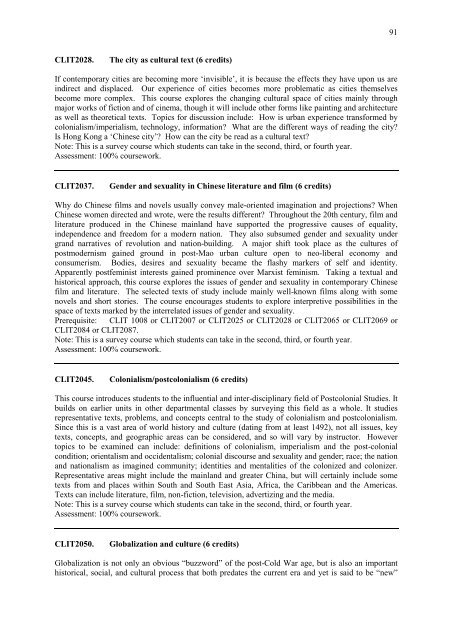(BA) (4-year-programme) - The University of Hong Kong
(BA) (4-year-programme) - The University of Hong Kong
(BA) (4-year-programme) - The University of Hong Kong
You also want an ePaper? Increase the reach of your titles
YUMPU automatically turns print PDFs into web optimized ePapers that Google loves.
91CLIT2028.<strong>The</strong> city as cultural text (6 credits)If contemporary cities are becoming more ‘invisible’, it is because the effects they have upon us areindirect and displaced. Our experience <strong>of</strong> cities becomes more problematic as cities themselvesbecome more complex. This course explores the changing cultural space <strong>of</strong> cities mainly throughmajor works <strong>of</strong> fiction and <strong>of</strong> cinema, though it will include other forms like painting and architectureas well as theoretical texts. Topics for discussion include: How is urban experience transformed bycolonialism/imperialism, technology, information? What are the different ways <strong>of</strong> reading the city?Is <strong>Hong</strong> <strong>Kong</strong> a ‘Chinese city’? How can the city be read as a cultural text?Note: This is a survey course which students can take in the second, third, or fourth <strong>year</strong>.Assessment: 100% coursework.CLIT2037.Gender and sexuality in Chinese literature and film (6 credits)Why do Chinese films and novels usually convey male-oriented imagination and projections? WhenChinese women directed and wrote, were the results different? Throughout the 20th century, film andliterature produced in the Chinese mainland have supported the progressive causes <strong>of</strong> equality,independence and freedom for a modern nation. <strong>The</strong>y also subsumed gender and sexuality undergrand narratives <strong>of</strong> revolution and nation-building. A major shift took place as the cultures <strong>of</strong>postmodernism gained ground in post-Mao urban culture open to neo-liberal economy andconsumerism. Bodies, desires and sexuality became the flashy markers <strong>of</strong> self and identity.Apparently postfeminist interests gained prominence over Marxist feminism. Taking a textual andhistorical approach, this course explores the issues <strong>of</strong> gender and sexuality in contemporary Chinesefilm and literature. <strong>The</strong> selected texts <strong>of</strong> study include mainly well-known films along with somenovels and short stories. <strong>The</strong> course encourages students to explore interpretive possibilities in thespace <strong>of</strong> texts marked by the interrelated issues <strong>of</strong> gender and sexuality.Prerequisite: CLIT 1008 or CLIT2007 or CLIT2025 or CLIT2028 or CLIT2065 or CLIT2069 orCLIT2084 or CLIT2087.Note: This is a survey course which students can take in the second, third, or fourth <strong>year</strong>.Assessment: 100% coursework.CLIT2045.Colonialism/postcolonialism (6 credits)This course introduces students to the influential and inter-disciplinary field <strong>of</strong> Postcolonial Studies. Itbuilds on earlier units in other departmental classes by surveying this field as a whole. It studiesrepresentative texts, problems, and concepts central to the study <strong>of</strong> colonialism and postcolonialism.Since this is a vast area <strong>of</strong> world history and culture (dating from at least 1492), not all issues, keytexts, concepts, and geographic areas can be considered, and so will vary by instructor. Howevertopics to be examined can include: definitions <strong>of</strong> colonialism, imperialism and the post-colonialcondition; orientalism and occidentalism; colonial discourse and sexuality and gender; race; the nationand nationalism as imagined community; identities and mentalities <strong>of</strong> the colonized and colonizer.Representative areas might include the mainland and greater China, but will certainly include sometexts from and places within South and South East Asia, Africa, the Caribbean and the Americas.Texts can include literature, film, non-fiction, television, advertizing and the media.Note: This is a survey course which students can take in the second, third, or fourth <strong>year</strong>.Assessment: 100% coursework.CLIT2050.Globalization and culture (6 credits)Globalization is not only an obvious “buzzword” <strong>of</strong> the post-Cold War age, but is also an importanthistorical, social, and cultural process that both predates the current era and yet is said to be “new”
















